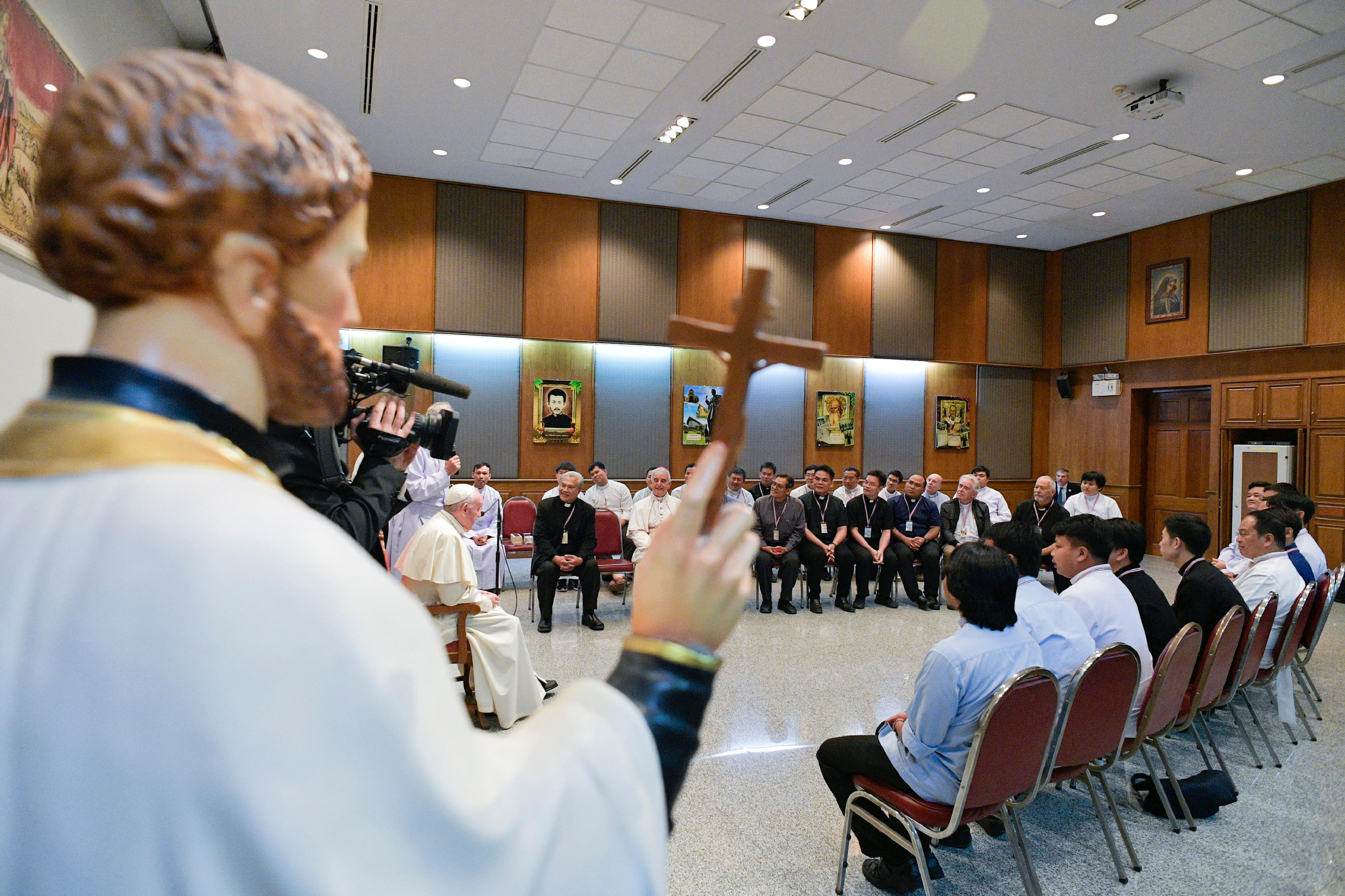APOSTOLIC VISITS
Eight speeches in two days; the central, cross-cutting imperative is combating human trafficking, a scourge that disfigures and enslaves women and children. A snapshot of the Pope’s journey to Thailand, the first leg of his 32nd apostolic visit that will bring him to Japan in the next three days. Peace, dialogue, protection of migrants are the themes addressed in his speeches. The style of the first missionaries is the role model. “We must learn from you”, Francis said in recognition of the small flock of Catholics, in a country with an overwhelming majority of Buddhists

When the Pope arrives, the first pontiff to visit Thailand since John Paul II 35 years ago, Bangkok’s national sports stadium can hardly contain the crowd. Facing over 65,000 people, welcomed by a choreography of traditional dances featuring golden yellow, the colour of sacredness, and red, the colour of celebration, his first thoughts go to the “boys, girls and women exposed to prostitution and trafficking, disfigured in their innermost dignity.” “Trafficking” is a term reiterated throughout the visit to this “smiling people”, as Francis describes them. To “end the scourge” of human trafficking “and other forms of modern slavery” is his plea from Bangkok’s Chulalongkorn University, the oldest in the Country, where he met Christian leaders along with leaders of other religions. “You have taken upon yourselves the concerns of your people: the scourge of drugs and human trafficking”, the Pope said during his meeting with the bishops of the Episcopal Conference of Thailand and of the Federation of Asian Bishops’ Conferences (FABC) in the Shrine of Blessed Nicholas Bunkerd Kitbamrung in the Catholic village of Wat Roman in Tha Kham.
“Young people enslaved by drugs and meaninglessness, ultimately darkening their gaze and destroying their dreams; migrants stripped of their homes and their families, exploited fishermen and ignored beggars.”
Francis’ shared his extensive concerns at the Bangkok Stadium: “All of them are part of our family. They are our mothers, our brothers and sisters.” “Let us not strip our communities of their faces, their wounds, their smiles, their lives,” was the Pope’s appeal.
Outlining the history of the country, 350 years since the advent of Christianity in Thailand, the Pope gave prominence to the missionaries’ commitment: “A missionary disciple – the Pope said – is not a mercenary of the faith or a producer of proselytes.” “The Church does not grow by proselytizing but by attraction”, Francis said meeting the clergy in Saint Peter’s Cathedral: “for many people Christianity is a foreign faith, a religion for foreigners.” “Let us not be afraid to continue inculturating the Gospel”, is the imperative, combined with the call “to find ways to profess the faith ‘in dialect’, like a mother who sings lullabies to her baby.”
Thailand, a multi-ethnic nation, that “has long known the importance of building harmony and peaceful coexistence between its numerous ethnic groups”,
is the portrait depicted in his first speech to the “smiling people”, addressed to Authorities, Representatives of Civil Society and the Diplomatic Corps. Thailand, “a land so rich in natural beauty, and the splendid guardian of age-old spiritual and cultural traditions, like that of the hospitality”, said the Pope. “I would like personally to assure you of the full commitment of Thailand’s small but vibrant Catholic community – the Pope said to the Catholic faithful representing 0-59% of the overall population, 95% of whom are Buddhists – to maintain and promote the distinctive characteristics of the Thai people, as evoked in your national anthem: peaceful and loving, but not cowardly. They are likewise firmly resolved to confront all that would lead us to be insensitive to the cry of our many brothers and sisters who yearn to be freed from the yoke of poverty, violence and injustice.”
“Protecting the dignity and rights of migrants and refugees, who face dangers, uncertainty and exploitation in their quest for freedom and a decent life for their families”,
is Francis’ appeal in a Country that welcomes almost 5 million migrants.
“When we have the opportunity to appreciate and esteem one another in spite of our differences, we offer a word of hope to the world, which can encourage and support those who increasingly suffer the harmful effects of conflict”,
the Pope said in his Greeting to the Supreme Patriarch of the Buddhists Somdet Somdet Phra Ariyavongsagatanana IX, who entered with him in the Wat Ratchabophit Sathit Maha Simaram Temple. “To promote among the followers of our religions the development of new charitable projects, capable of generating and multiplying practical initiatives on the path of fraternity, especially with regard to the poor and our much-abused common home”, is the dialogue indication on the wake of the Abu Dhabi Document on Human Fraternity given as a gift to the Patriarch at the end of the meeting.
“Provide a new paradigm for conflict resolution, contribute to fostering greater understanding and the protection of creation”:
the Holy Father told Christian leaders and leaders of other religions during the meeting at Chulalongkom University in Bangkok, inviting them to continue working together on common projects.
“How much we can learn from you, who are a minority in many of your countries or regions, yet have not let yourselves be carried away or corrupted by an inferiority complex or the complaint that you are not given due recognition!”,
was the Pope’s commendation during the meeting with the bishops. “Many of your lands were evangelized by the lay faithful”, Francis pointed out. “Be deeply rooted in the faith of your ancestors : fathers, grandparents and teachers”, the Pope told youths in the Mass for Young People celebrated in Bangkok’s Cathedral. “Not to remain prisoners of the past, but to learn to have the courage that can help us address new circumstances in history,” the Pope said with regard to a special feature of the Thai people: care and respect for the elderly, an antidote to the “tricks” and blunders to which young people are exposed today, prey to a “homogenization” of values.